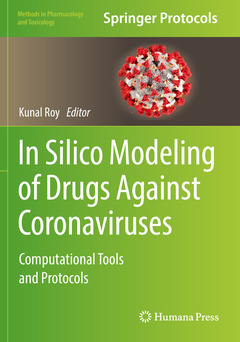In Silico Modeling of Drugs Against Coronaviruses, 1st ed. 2021 Computational Tools and Protocols Methods in Pharmacology and Toxicology Series
Langue : Anglais
Coordonnateur : Roy Kunal

This essential volume explores a variety of tools and protocols of structure-based (homology modeling, molecular docking, molecular dynamics, protein-protein interaction network) and ligand-based (pharmacophore mapping, quantitative structure-activity relationships or QSARs) drug design for ranking and prioritization of candidate molecules in search of effective treatment strategy against coronaviruses. Beginning with an introductory section that discusses coronavirus interactions with humanity and COVID-19 in particular, the book then continues with sections on tools and methodologies, literature reports and case studies, as well as online tools and databases that can be used for computational anti-coronavirus drug research. Written for the Methods in Pharmacology and Toxicology series, chapters include the kind of practical detail and implementation advice that ensures high quality results in the lab.
Comprehensive and timely, In Silico Modeling ofDrugs Against Coronaviruses: Computational Tools and Protocols is an ideal reference for researchers working on the development of novel anti-coronavirus drugs for SARS-CoV-2 and for coronaviruses that will likely appear in the future.
- Part I Introduction. - History and Recent Advances in Coronavirus Discovery. - The Origin, Transmission, and Clinical Therapies in the Management of Coronavirus Diseases. - Transmission, Medical Consequences, and Prevention/Treatment of COVID-19 Infection. - Molecular-Level Targets for the Development of Therapies Against Coronavirus Diseases. - Candidate Drugs for the Potential Treatment of Coronavirus Diseases. - Part II Tools and Methodologies. - Ligand-Based Approaches for theDevelopment of Drugs Against SARS-CoV-2. - Computational Drug Repurposing for the Development of Drugs Against Coronaviruses. - Computational Methods and Tools for Repurposing of Drugs Against Coronaviruses. - Molecular Multi-target Approach on COVID-19 for Designing Novel Chemicals. - Structural Bioinformatics to Unveil Weaknesses of Coronavirus Spike Glycoprotein Stability. - Protein–Protein Interaction Network for the Identification of New Targets Against Novel Coronavirus. - Nonequilibrium Alchemical Simulations for the Development of Drugs
Against Covid-19. - Therapeutic and Vaccine Strategies for Stopping the COVID-19 Pandemic Based on Structural and Molecular Modeling Studies of Virus-Ganglioside Interactions. - Discovery of Covalent Drugs Targeting the Key Enzymes of SARS-CoV-2 Using SCARdock. - Machine Learning Techniques for Development of Drugs Against Coronavirus Disease 2019 (COVID-19): A Case Study Protocol. - Part III Case Studies and Literature Reports. - Dissecting the Drug Development Strategies Against SARS-CoV-2 Through Diverse Computational Modeling Techniques. - Recent Perspectives on COVID-19 and Computer-Aided Virtual Screening ofNatural Compounds for the Development of Therapeutic Agents Towards SARS-CoV-2. - Computational Modeling of Protease Inhibitors for the Development of Drugs Against Coronaviruses. - Computational Modeling of ACE2-Mediated Cell Entry Inhibitors for the Development of Drugs Against Coronaviruses. - Computational Modeling of RdRp Inhibitors for the Development of Drugs against Novel Coronavirus (nCoV). - Computational Modeling of Chloroquine Analogues for Development of Drugs Against Novel Coronavirus (nCoV). - Computational Modeling of ACE2 Inhibitors for Development of Drugs Against Coronaviruses. - Deep Learning-Based Drug Screening for COVID-19 and Case Studies. - Virtual Screening of Natural Compounds Targeting Proteases of Coronaviruses and Picornaviruses. - Molecular Simulation–Driven Drug Repurposing for the Identification of Inhibitors Against Non-Structural Proteins of SARS-CoV-2. - Part IV Online Tools and Databases. - Online Tools and Antiviral Databases for the Development of Drugs Against Coronaviruses. - Online Resource and Tools for the Development of Drugs Against Novel Coronavirus. - Drug Databases for Development of Therapeutics Against Coronaviruses.
Dr. Kunal Roy is Professor & Head of the Department of Pharmaceutical Technology, Jadavpur University, Kolkata, India (https://sites.google.com/site/kunalroyindia). He has been a recipient of the Commonwealth Academic Staff Fellowship (University of Manchester, 2007) and Marie Curie International Incoming Fellowship (University of Manchester, 2013) and was a former visiting scientist of Istituto di Ricerche Farmacologiche "Mario Negri" IRCCS, Milano. Italy. The field of his research interest is Quantitative Structure-Activity Relationship (QSAR) and Molecular Modeling with application in Drug Design, Property Modeling, and Predictive Ecotoxicology. Dr. Roy has published more than 300 research articles (ORCID: http://orcid.org/0000-0003-4486-8074) in refereed journals (current SCOPUS h index 43; total citations till date 9562). He has also coauthored two QSAR related books (with Academic Press and Springer Nature), edited six QSAR books (Springer Nature, Academic Press, and IGI Global), and published more than ten book chapters. Dr. Roy is the Co-Editor-in-Chief of Molecular Diversity (Springer Nature) and Editor-in-Chief of International Journal of Quantitative Structure-Property Relationships (IGI Global). Dr. Roy serves on the Editorial Boards of several international journals including (1) European Journal of Medicinal Chemistry (Elsevier); (2) Journal of Molecular Graphics and Modelling (Elsevier); (3) Computational and Structural Biotechnology Journal (Elsevier); (4) Chemical Biology and Drug Design (Wiley); (5) Expert Opinion on Drug Discovery (Informa); (6) Letters in Drug Design and Discovery (Bentham); and (7) Current Computer-Aided Drug Design (Bentham). Apart from this, Prof. Roy is a regular reviewer for QSAR papers in the journals like Chemosphere (Elsevier), Journal of HazardousMaterials (Elsevier), Ecotoxicologyand E
Documents protocols and case studies of computational drug design and computational drug repurposing Features structure-based and ligand-based approaches in drug design Covers machine learning/deep learning techniques in the development of coronavirus therapies Includes online tools and databases useful for computational anti-coronavirus drug development
Date de parution : 08-2021
Ouvrage de 788 p.
17.8x25.4 cm
Date de parution : 08-2021
Ouvrage de 788 p.
17.8x25.4 cm
Thèmes d’In Silico Modeling of Drugs Against Coronaviruses :
© 2024 LAVOISIER S.A.S.



